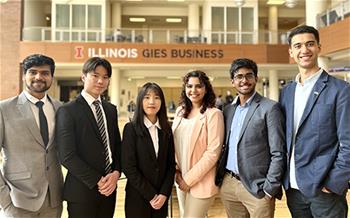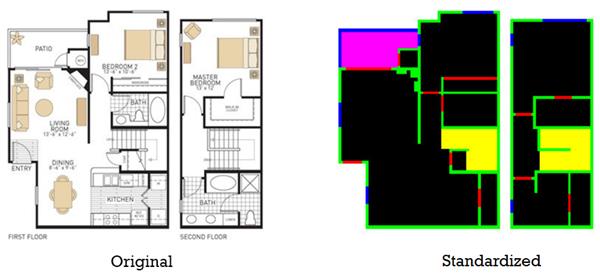Apr 28, 2022
MSBA students building software to guide first responders
Saving lives in a burning building will be easier thanks to the Shield Portal, a project in the Master of Science in Business Analytics (MSBA) program at Gies College of Business.
As part of their yearlong Business Practicum class taught by Professor Zack Kertcher, students are partnering with Ascent Integrated Tech, a Research Park-based startup. Ascent is using data analytics to create human performance technology that assists with command control of firefighters, SWAT, and warfighters by providing actionable insight of the location, health, and environment of operators during high-intensity, small-unit tactics.
“The Ascent project shows the power of learning with and from analytics. With a unique hands-on experience of having a relatively open-ended challenge, and a lot of messy data, the students need to think creatively,” said Kertcher, a clinical assistant professor of business administration. “Working closely with Ascent for two semesters, the students learn the challenges, along with data and modeling opportunities, to generate a solution that has immediate business applications. In this instance, learning from the model, first responders’ lives will be saved.”
Ascent CEO Paul Couston agrees, “Our company believes analytics can save the lives of heroes. Gies students have become integral to turning this idea into a reality.”
 The Gies team – (from left to right) Tejas Dhomne, James Lee, Ella Chen, Prachi Deepak Nerkar, Arpit Jayaswal, and Bekhzod Aliev – are all students in Gies’ STEM-designated MSBA. It is a nine-month, full-time residential program in which students learn how to use data to solve complex business problems.
The Gies team – (from left to right) Tejas Dhomne, James Lee, Ella Chen, Prachi Deepak Nerkar, Arpit Jayaswal, and Bekhzod Aliev – are all students in Gies’ STEM-designated MSBA. It is a nine-month, full-time residential program in which students learn how to use data to solve complex business problems.
“As a business analyst, I’m accustomed to understanding and explaining complex problems and looking for ways to resolve conflict and build consensus,” said Jayaswal. “I was drawn to working with a startup because I was amazed at what they are doing – and in this type of environment you can easily talk to the entire organization and discover all of their goals and what they needed from us to be successful.”
An example of the data-driven innovations the student team helped develop with Ascent is the Shield Portal, which uses artificial intelligence to predict floor plans for multi-unit and single-family homes.
“Nowadays, firefighters don’t have the necessary tools or assistance to navigate inside buildings,” said Nerkar. “How the process works now is that a fire chief uses a walkie-talkie to direct those inside, but those outside have no knowledge about where doors and windows are. We can help them be more exact and have more visibility to what’s happening.”
The first phase of the project focuses on creating actionable insights from 11,000 floor plans gathered through open sources from India, the UK and the US. The floor plans come in different styles and formats, which need to be standardized before they can be used to train the model.

“The biggest challenge is not the model, but the data itself. Originally, we had to standardize formats and the manual process of cleaning up the data is time-consuming,” said Chen. Cass Sheng, the lead machine learning engineer is working on an algorithm to partially automate this process and make it less time consuming.
Added Jayaswal: “It’s still difficult because some units have a balcony or curved walls that don’t follow vertical and perpendicular lines.”
The next phase will be the training, testing and integrating the machine learning model into the portal. Ultimately, along with automated floor plan generation, the portal will connect to body sensors to gauge temperature and oxygen levels of firefighters. Ascent has already booked $70,000 in annual recurring revenue from Central Illinois fire departments as well a $1.25 million contract with the US Air Force for the floor plan artificial intelligence functionality. The company is also currently working with first responders in Central Illinois to pilot the predictive model on a controlled fire.
“What is unique about our program is that it runs the entire year, not just one term. It is among the first courses all MSBA students take at Gies. They all experience working with a real data-driven challenge. They leverage everything they learn in their Gies classes, as well as the diverse knowledge and experiences they bring to Gies,” said Kertcher. “They also gain essential teamwork, presentation, and leadership skills. Combined, these experiences get them ready to hit the road running after graduation; there is little or no classroom-to-corporate adjustment.”
“This project gave me the opportunity to apply my experience as a data scientist to partner with the leaders of an innovative company as well as my peers to make sure we’re aligned, collaborating, and meeting our deadlines,” said Dhomne. “Through the Gies MSBA program I’m learning trending technologies and tools for shaping human lives. It will give me an in-depth understanding of my specialty and career focus, ultimately allowing me more freedom in choosing a data scientist role.”
